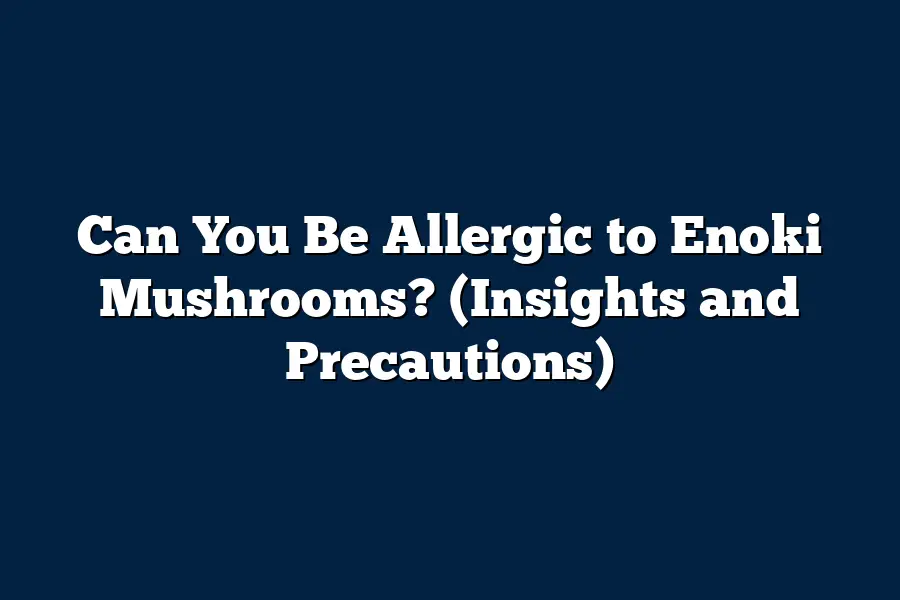Yes, it is possible to be allergic to enoki mushrooms. Enoki mushrooms belong to the fungi family, and like other types of mushrooms, they can trigger allergic reactions in some individuals. Symptoms of an allergic reaction to enoki mushrooms may include hives, itching, swelling, or even more severe reactions such as difficulty breathing. If you suspect you are allergic to enoki mushrooms, it is important to avoid consuming them and consult with a healthcare professional for proper diagnosis and guidance.
Hey there, mushroom lovers and allergy warriors!
Ready to uncover the truth about Enoki mushroom allergies?
This guide has you covered from symptoms to management.
Let’s get to the root of it all together!
🍄 #AllergyAwareness #EnokiMushrooms
Table of Contents
Symptoms of Enoki Mushroom Allergies – What to Look Out For
When it comes to enoki mushrooms, they are a tasty addition to many dishes.
However, for some individuals, consuming these mushrooms can lead to allergic reactions.
In this section, we’ll delve into the symptoms of enoki mushroom allergies to help you identify and manage any potential allergic reactions.
Common Symptoms
Enoki mushroom allergies can manifest in various ways, with symptoms ranging from mild to severe.
Here are some common symptoms to look out for:
Skin Reactions: Individuals with enoki mushroom allergies may experience skin-related symptoms such as itching, hives, or eczema.
Gastrointestinal Issues: Allergic reactions to enoki mushrooms can also lead to gastrointestinal problems like nausea, vomiting, diarrhea, or abdominal pain.
Respiratory Distress: In some cases, consuming enoki mushrooms can trigger respiratory symptoms like coughing, wheezing, or difficulty breathing.
Anaphylaxis: Although rare, severe allergic reactions to enoki mushrooms can result in anaphylaxis, a life-threatening condition that requires immediate medical attention.
Cross-Reactivity
It’s essential to note that individuals who are allergic to certain foods may also experience cross-reactivity with enoki mushrooms.
This means that if you have allergies to foods such as bananas, latex, or certain tree nuts, you may be at a higher risk of developing an allergic reaction to enoki mushrooms.
Diagnosis and Treatment
If you suspect that you have an enoki mushroom allergy based on the symptoms you’re experiencing, it’s crucial to consult with an allergist for proper diagnosis and treatment.
Allergy testing can help confirm whether you are allergic to enoki mushrooms, and your allergist can provide guidance on managing your allergy.
In terms of treatment, managing enoki mushroom allergies typically involves avoiding consumption of these mushrooms and carrying an epinephrine auto-injector in case of severe allergic reactions.
By being aware of the symptoms of enoki mushroom allergies and understanding how to address allergic reactions effectively, you can continue to enjoy a diverse range of foods while prioritizing your health and well-being.
Remember, if you suspect an allergic reaction, seeking medical guidance is always the best course of action to stay safe and healthy.
Causes of Allergic Reactions to Enoki Mushrooms
Have you ever experienced an allergic reaction after consuming enoki mushrooms?
You’re not alone.
Let’s dive into the possible causes behind these adverse reactions.
Contaminants in Enoki Mushrooms
Enoki mushrooms are known to be susceptible to contamination, primarily during the cultivation process.
One concerning contaminant is a bacterium called Listeria monocytogenes.
This pathogen can lead to severe infections, especially in vulnerable populations like pregnant women, older adults, and individuals with weakened immune systems.
Cross-Reactivity with Other Allergens
Individuals with existing allergies to certain foods may experience cross-reactivity when consuming enoki mushrooms.
For example, if you have a known allergy to certain types of mold or mold spores, you may be more likely to develop an allergic reaction to enoki mushrooms.
Histamine Intolerance
Enoki mushrooms, like other fungi, contain histamine.
In some cases, individuals may have an intolerance to histamine, leading to symptoms like headaches, gastrointestinal distress, and skin reactions after consuming foods high in histamine, such as enoki mushrooms.
Personal Sensitivities and Genetic Factors
Each person’s immune system is unique, and some individuals may simply have a sensitivity to certain compounds present in enoki mushrooms.
Genetic factors can also play a role in predisposing someone to allergic reactions or intolerances to specific foods, including enoki mushrooms.
Lack of Regulation and Quality Control
The lack of stringent regulation and quality control measures in the cultivation and distribution of enoki mushrooms can also contribute to the risk of allergic reactions.
Improper handling, storage, or processing of these mushrooms can lead to contamination or the presence of harmful substances that trigger allergies.
allergic reactions to enoki mushrooms can stem from various factors, including contaminants, cross-reactivity with other allergens, histamine intolerance, personal sensitivities, genetic factors, and issues related to regulation and quality control.
If you suspect that you are allergic to enoki mushrooms or experience any unusual symptoms after consuming them, it’s essential to consult a healthcare provider for proper diagnosis and guidance.
Stay informed and stay safe!
Managing Enoki Mushroom Allergies – Precautions and Tips
Enoki mushrooms are a delicious addition to many dishes, but for some individuals, they can trigger allergic reactions.
If you suspect you may be allergic to enoki mushrooms, it’s essential to take precautions and learn how to manage this allergy effectively.
Recognizing the Symptoms
Allergic reactions to enoki mushrooms can vary in severity from mild to potentially life-threatening.
It’s crucial to be able to recognize the symptoms so you can take action promptly.
Common symptoms of an enoki mushroom allergy include:
- Itchy skin
- Hives
- Swelling of the lips, tongue, or throat
- Nausea or vomiting
- Difficulty breathing
If you experience any of these symptoms after consuming enoki mushrooms, seek medical attention immediately.
Consulting a Healthcare Provider
If you suspect you have an allergy to enoki mushrooms, schedule an appointment with an allergist for proper testing and diagnosis.
Your healthcare provider can conduct skin prick tests or blood tests to determine if you are allergic to enoki mushrooms.
Avoiding Cross-Contamination
To prevent accidental exposure to enoki mushrooms and minimize the risk of an allergic reaction, take precautions to avoid cross-contamination in your kitchen.
Here are some tips to follow:
- Keep enoki mushrooms separate from other ingredients in your kitchen.
- Use separate cutting boards and utensils when preparing enoki mushrooms.
- Wash your hands thoroughly after handling enoki mushrooms to prevent accidental ingestion.
Reading Food Labels Carefully
When grocery shopping or dining out, always read food labels carefully to check for the presence of enoki mushrooms in products.
Be cautious of dishes that may contain hidden enoki mushrooms, such as soups, stir-fries, and salads.
Educating Others
If you have been diagnosed with an enoki mushroom allergy, educate your friends, family, and co-workers about your condition.
Ensure they are aware of the seriousness of the allergy and the necessary steps to take in case of an allergic reaction.
Carrying an Epinephrine Auto-Injector
In case of a severe allergic reaction to enoki mushrooms, having an epinephrine auto-injector can be a life-saving measure.
Carry this device with you at all times and make sure you know how to use it correctly.
By taking these precautions and following these tips, you can effectively manage an enoki mushroom allergy and reduce the risk of experiencing an allergic reaction.
Remember, always prioritize your health and safety when dealing with food allergies.
When to Seek Medical Help for Enoki Mushroom Allergies
If you suspect you may have an allergy to enoki mushrooms, it’s essential to be aware of when it’s time to seek medical help.
Symptoms of Enoki Mushroom Allergies
When consuming enoki mushrooms, keep an eye out for the following common symptoms that may indicate an allergic reaction:
- Digestive Issues: Symptoms such as nausea, vomiting, diarrhea, or stomach cramps could be a sign of an allergic reaction.
- Skin Reactions: Look for hives, itching, redness, or swelling on the skin after eating enoki mushrooms.
- Respiratory Problems: Allergic reactions can also manifest as sneezing, nasal congestion, wheezing, or difficulty breathing.
It’s crucial to pay attention to these symptoms and how your body reacts after consuming enoki mushrooms.
Severity of Reactions
Allergic reactions to enoki mushrooms can vary in severity from mild to severe.
Understanding the level of your reaction can help determine when to seek medical help:
Mild Reactions: Mild symptoms may include itchiness, mild stomach upset, or a slight skin rash. In such cases, over-the-counter antihistamines may help manage the symptoms.
Moderate Reactions: Moderate symptoms like persistent vomiting, increased stomach pain, or worsening skin reactions may require a visit to urgent care or your primary healthcare provider.
Severe Reactions: If you experience difficulty breathing, swelling of the throat, a rapid pulse, or dizziness after consuming enoki mushrooms, seek immediate medical attention by calling emergency services.
When to Consult a Healthcare Provider
If you suspect an allergy to enoki mushrooms based on recurring symptoms after consumption, it is advisable to consult a healthcare provider promptly.
They can help confirm the allergy through testing and provide guidance on managing allergic reactions.
Being aware of the symptoms of enoki mushroom allergies and understanding the severity of allergic reactions is crucial for determining when to seek medical help.
If you experience any concerning symptoms or suspect an allergy, do not hesitate to reach out to a healthcare provider for proper evaluation and guidance.
Your health and well-being should always be the top priority when dealing with potential food allergies.
Final Thoughts
Being aware of the symptoms and causes of enoki mushroom allergies is key to safeguarding your health.
Remember to closely monitor any reactions like itching, swelling, hives, or digestive issues after consuming these mushrooms.
Implementing precautionary measures, such as avoiding enoki mushrooms if you suspect an allergy, can significantly reduce the risk of a severe allergic reaction.
If you experience any concerning symptoms, don’t hesitate to seek medical advice promptly.
Your health and well-being are paramount, so stay informed, stay safe, and consult with a healthcare provider or allergist for personalized guidance on managing enoki mushroom allergies effectively.
Remember, knowledge is empowering when it comes to protecting yourself and your loved ones.

